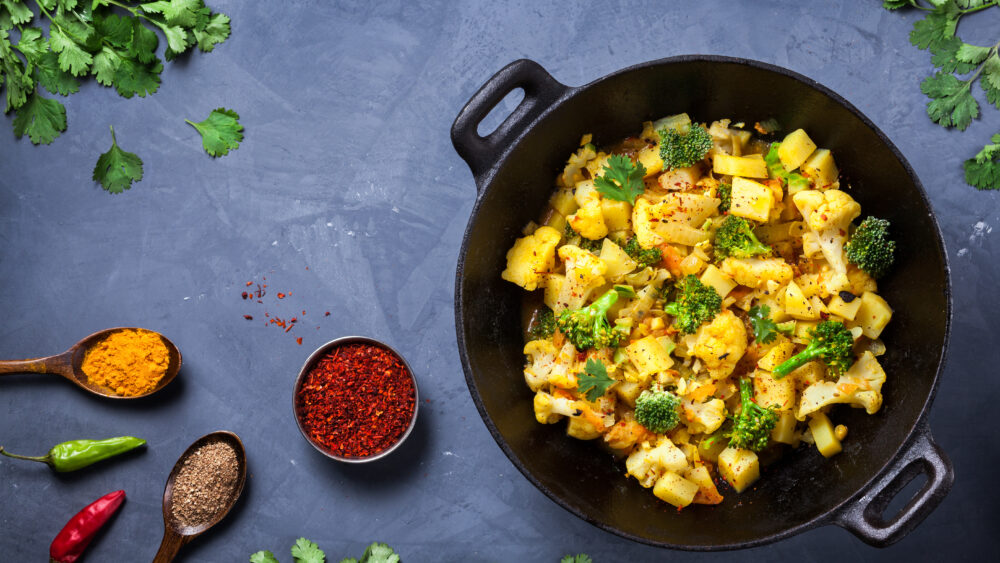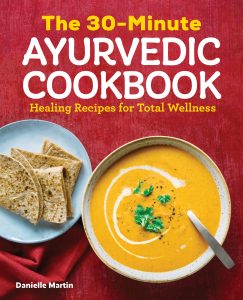 If you feel like you are struggling to get through your days, you may need to revise your breakfast menu. Although Ayurveda states that lunch should be your largest meal, it is equally important to eat a healthy and nourishing breakfast to fuel you for the day. By feeding your body the proper nutrition each morning, you can sustain and stabilize your energy, appetite, and mood—no matter what the day may bring!
If you feel like you are struggling to get through your days, you may need to revise your breakfast menu. Although Ayurveda states that lunch should be your largest meal, it is equally important to eat a healthy and nourishing breakfast to fuel you for the day. By feeding your body the proper nutrition each morning, you can sustain and stabilize your energy, appetite, and mood—no matter what the day may bring!
With our busy mornings and non-stop schedules, breakfast can easily become a protein bar, bagel, bowl of cereal, piece of fruit, cup of coffee, or simply forgotten altogether. Our bodies and digestive fires need fuel, especially after a long night’s rest and frankly, none of these options will suffice. Skipping breakfast, eating too little, or eating a carb-based meal (especially refined carbs) can lead to energy crashes, high Vata, anxiety, irregular mood patterns, blood sugar fluctuations, weakness, and muscle wasting (especially as you age).
What makes a healthy breakfast?
A healthy breakfast will vary a bit from person to person (and season to season) but some recommendations are relatively universal. Overall you are looking for a meal that is not too big, nor too small. You want to make sure there is a hefty dose of lean protein and fiber along with a smaller amount of wholegrain carbohydrates and a bit of healthy fat. You want to make sure you are following the proper food combinations. And most importantly, you want to make sure you are eating sitting down and without distraction (not eating a breakfast bar as you drive to work!).
But this is just the tip of the iceberg. Here are my essential healthy breakfast “dos” and “don’ts”. If these recommendations are far from what you are doing now, take it slow and refine it as you go. Even little changes can create BIG results.*
*For example, if your breakfast is currently a cup of coffee, eating a warm bowl of quick oats topped with hemp seeds is still a step in the right direction!
Healthy Breakfast DOs
- Start your day with hot water or hot lemon water to ignite Agni (digestion) and spark hunger
- Aim for a breakfast time of 7 am to 8 am (give or take)
- Eat enough to sustain you until lunch but not so much that you feel sleepy, heavy, or uncomfortable
- Eat at least 15 to 20 grams of lean protein*
- Eat at least 10 grams of fiber (with a daily goal of 30 grams)
- Favor whole grains such as steel-cut oats, quinoa, buckwheat, amaranth, and millet
- Include a healthy fat such as olive oil, ghee, coconut oil, tahini, avocado, nuts, or seeds
- When needed, favor a small amount of natural sweeteners such as honey and maple syrup
- Eat warm, spiced, easy-to-digest meals (ideally homemade)
- Eat freshly cooked meals when possible (but remember, reheating a healthy meal is better than opting for a breakfast bar or piece of toast)
- Always eat sitting down, in a peaceful space, with full attention (no work, emails, or electronics!!)
*Studies (see references below) have shown that breakfast is the most important meal to support increased muscle strength and can lead to muscle wasting with too little amounts.
Healthy Breakfast DON’Ts
- Don’t skip breakfast or eat too late (10 am or later)
- Avoid all processed and refined foods (including quick oats or “instant” anything)
- Avoid foods with sugar (white, cane, etc)
- Avoid high-carb, low-protein meals (e.g. bagel, avocado toast, or oatmeal)
- Avoid cold cereal and milk—this is processed, high in sugar/carbohydrates, (often) low in protein, and considered rough, dry, cold, and hard-to-digest
- Avoid improper food combinations—this includes eating fruit* with any other foods such as oatmeal or yogurt (read full list here)
- Avoid eating only fruit for breakfast*—fruits are high in carbs, low in protein, and do not contain not enough sustenance
- Avoid cold smoothies—these are considered raw, cold, heavy, hard to digest, and most likely have some improper food combinations**
- Avoid raw green juice—this is considered raw, cold, hard to digest, Vata-provoking, and devoid of fiber and protein
- Avoid drinking caffeine on an empty stomach
*If you are wanting fruit in the mornings, eat a piece by itself either 30 minutes before breakfast or 2 hours after breakfast.
**A properly made smoothie eaten in the summertime can be alright at times—read my healthy smoothie tips article to get some ideas!
What if you are not hungry in the morning?
According to Ayurveda, lack of hunger in the morning is a sign of sluggish digestion (aka Manda Agni). This could be due to eating too late at night or eating too heavy of a meal for dinner. It could be caused by a long-term habit of not eating in the morning, which will slow down your metabolism in time. It could simply be caused by excessive toxins in the GI tract clogging the channels.
Whatever the reason, it would be best to stimulate digestion and flush toxins while slowly introducing healthy breakfast foods. This can be done by drinking hot water first thing each morning followed by a digestive aid such as our Agni Elixir. For this, drink one tablespoon of the Agni Elixir mixed in a cup of warm water (yum!) about 30 minutes before the desired breakfast time.
If detoxification is your focus our Daily Detox Formula is great for flushing toxins AND stimulating digestion. I suggest taking ½ to 1 teaspoon each upon awakening and again before bed as needed.
Until there is real hunger, it is best to keep your breakfast meal simple and small such as eating a small cup of kitchari, a cup of bone broth, or one egg with some steamed veggies. Slowly increase the amount of food as your morning hunger awakens.
What if you are intermittent fasting?
I know many individuals who are not eating until 12 or 1 pm because of their intermittent fasting schedule. Although I am a big advocate of intermittent fasting, most individuals seem to have it backward when it comes to optimizing the health digestion benefits from this practice; they are eating until late into the night and then not eating anything until late into the following day. This is counterproductive since eating too late at night is one of the main causes of toxins, weight gain, and sluggish digestion and not eating enough in the morning will create low energy, weakness, and muscle wasting.
So if intermittent fasting is your goal, I would ultimately suggest eating a lighter dinner by 4 or 5 pm each night and then allowing yourself a wholesome breakfast by 7 or 8 am each morning.

Healthy Breakfast Ideas
Here are some of my tried and true breakfast meals with a couple of options for everyone whether you are omnivore, vegetarian, or vegan. Although I have a few favorites, I often rotate between these recipes depending on my “mood” for the day as well as my digestion and nutritional needs. I used to steer toward the “sweet” side of breakfast recipes for most of my life, but I recently have been experimenting with some savory options and I am surprised that I now actually prefer them many mornings!
1. Quinoa Porridge
I like this option for the mornings when I need a light and simple breakfast. Quinoa is a great (pseudo) grain as it offers fewer calories and starch compared to oats and more protein (8 grams for 1/3 cup uncooked). Since I prefer to get at least 15 to 20 grams of protein each morning, I generally cook it with homemade nut/seed milk and add in some seeds and/or an egg to make it more sustainable. Here are two of my favorite quinoa porridge recipes:
2. Wholegrain porridge (with protein additions)
If quinoa is not your thing, any wholegrain porridge can become a good protein source with the proper ingredients. Whether you enjoy buckwheat, steel-cut oats, amaranth, or millet, you can enhance their protein content by adding in 1 to 2 eggs or egg whites at the very end of the cooking process and cook on low (stirring frequently) until the eggs are completely cooked. Just make sure you avoid adding sugar (a bit of honey or maple syrup is all right) and fruit.
If you prefer an egg-free diet, you may want to consider adding a small amount of protein powder*, or simply some ground-up nuts or seeds. Hemp seeds, pumpkin seeds, almonds, and sunflower seeds are some of the most protein-packed of the bunch**!
*I LOVE my Wilderness Poets’ Organic Hemp Protein and Naked Nutrition’s 100% Grassfed Whey Protein.
**I like to grind together one tablespoon each of hemp seed, flax seed, and coconut with 1/2 teaspoon of cacao to sprinkle on my porridges—YUM!
Here are a few wholegrain porridge recipes—don’t forget to add some additional protein!
3. Kitchari
For all of my fellow kitchari lovers, did you know that kitchari makes a delicious and super nutritious breakfast? It is not only a perfect protein and packed with fiber, but will sustain your appetite, energy, and mood throughout the morning without leaving you heavy and crashing. You can even add in a piece of Zucchini and Chickpea Flatbread for more protein and more yumminess.
Here are some great kitchari recipes to wake up to:
- Breakfast Kitchari Recipe
- Classic Cleansing Kitchari
- The Best Basic Kitchari Recipe
- Rejuvenation Kitchari
- Tridoshic Mung Dal and Quinoa Kitchari
Get all of your Kitchari necessities here!
4. Eggs (or tofu), sweet potato, and greens (wrap or bowl)
Boost your typical breakfast scramble with some nutrient-packed sweet potato and kale. You can use 2 to 3 eggs or tofu as your protein base, but don’t be shy with the greens and spices! Enjoy this scramble as is or make it a wrap by using a 100% wholegrain Chapati or homemade flatbread. Either way, it is a delicious and nutritious breakfast that will leave you energized and ready for the day!
5. Zucchini & Chickpea Flatbread with hummus and sautéed veggies
Hummus for breakfast, why not?? Paired with my Zucchini & Chickpea Flatbread and sautéed vegetables (change it up and make them colorful!), this savory breakfast is extremely high in protein, fiber, vitamins, and minerals, making it an amazingly sustaining breakfast recipe! With all the different components, however, it may be best to meal prep these recipes to allow you to warm, eat, and go for your busy mornings.
Get the recipes here:
More Sweet and Savory Meals Ideas
- Brown rice and black bean bowl with sautéed kale—topped with avocado
- Buckwheat, quinoa, or chickpea pancakes with scrambled eggs
- Whole wheat tortilla wrap with quinoa, eggs (or beans), sautéed veggies, and avocado
- Quinoa breakfast scramble with seasonal veggies, and eggs (or tofu)
References
- https://www.ncbi.nlm.nih.gov/pmc/articles/PMC8724572/
- https://www.ncbi.nlm.nih.gov/pmc/articles/PMC9328787/
Don’t forget the Ayurvedic Breakfast Spices!
Ignite your morning fire with our Agni Elixir!
Discover more healing recipes with my 30-Minute Ayurvedic Cookbook!
NOTE: All Amazon links are affiliate-based, but recommended with care! By ordering directly through these links you are helping to support Svastha Ayurveda. Thank you!!





